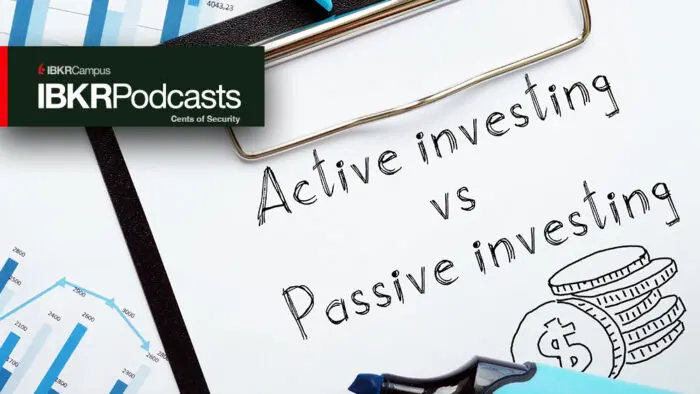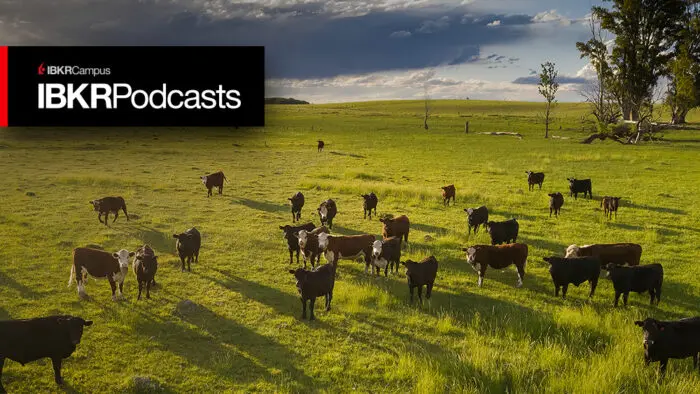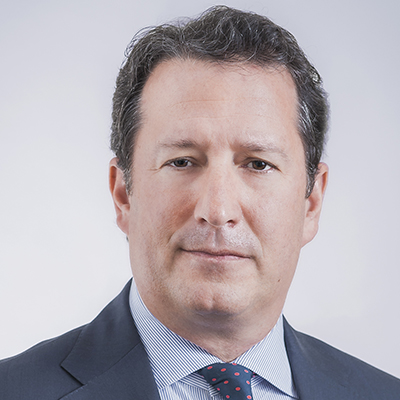With the 24 hour news cycle, social media, and global trading landscape, it’s hard to know what to look at. Steven M. Sears, COO of Options Solutions, joins IBKR’s Senior Manager of SEO and Content, Cassidy Clement, to discuss the maze of financial news and how to find the more solid information.
Contact Information:
ssears@optionssolutions.com
Summary – Cents of Security Ep. 15
The following is a summary of a live audio recording and may contain errors in spelling or grammar. Although IBKR has edited for clarity no material changes have been made.
Cassidy Clement
Welcome back to the sense of Security podcast. I’m Cassidy Clement, senior manager of SEO and content and Interactive Brokers. Today, I’m your host for our podcast. Our guest is Steven Sears. He’s the president and chief operating officer and co-founder of Options Solutions. He has deep experience with the options industry as an investor and exchange executive and journalist. So, with the 24-hour news cycle, social media and the global trading landscape, it’s hard to know what to review and where. So, we’re going to discuss finding your way through the maze of financial news to find more solid information. Welcome to the program, Steve.
Steven Sears
Great to be with you. Thanks for having me.
Cassidy Clement
Awesome. So, to kick off let’s give some of our listeners some background of yours in the financial news industry and finance industry.
Steven Sears
I have been in the options industry and on the street now since the mid ‘90s and I’ve had a deep fascination with what actually goes on within the marketplace and that led to be asked to start coverage of the trading community by Dow Jones in the Wall Street Journal. I currently write a column for Barron’s on options trading called The Striking Price, and have basically seen financial journalism grow out from being something that was on the back pages of newspapers to the front page.
Cassidy Clement
So, you’ve been able to take your information and give it to the people, and also take in some of the information that was given to the people by others.
Steven Sears
That’s exactly right. I like to say that I engage in what we call information arbitrage, that my job is to take the information from very sophisticated investors, some of whom work at your firm and at other banks or asset managers, and then I translate or synthesize that so that, almost anybody can understand it and make better financial decisions.
Cassidy Clement
So, on the topic of financial news and the media cycle, we’re going to talk about today, I think I can speak for everyone with this question, which is, there are so many different information sources, so much clickbait out there, are there certain sources to pay attention to and certain things to avoid? Usually, most people learn in high school when you’re writing a research paper or college, if you’re doing any type of university research, you want to look for the actual company website, maybe financial statements, well known sources, and the peer reviewed journal articles. But what are some other things that you kind of are like, ‘that’s what you should look for’.
Steven Sears
Well, I remember when I first started out without having a financial background and my big goal was to understand what it meant when one of the evening newscasters said the Dow Jones Industrial Average rose or fell, and I taught myself what those fellows meant by basically reading the Wall Street Journal and Barron’s. And I think those are very excellent places to start out. Now, of course, I’m biased because of my affiliation with those publications. But I think in general anybody who focuses on those two publications and reads the market coverage articles and reads local reports, and the corporate news will start to inculcate themselves with the foundation of knowledge. Now I have this approach that I call spider web learning. So, say you’re reading an article in those papers or the New York Times, or the Financial Times, and there’s a concept that you don’t know, or a phraseology that you don’t understand. Write it down and look it up. And you can sort of use the big major media publications as a way to get grounded and as a way to sort of guide your research into other areas.
Cassidy Clement
With all of this information that you have at your fingertips, all these information pieces, are there certain times that really make sense to pay attention for gathering research? I mean in financial news you’ll hear the buzzwords press release, earnings season, new product, or a political risk or change; are there certain other pieces that investors should say, ‘Ohh yes, the light bulb went off. Now I should start looking to pay attention even more’?
Steven Sears
Well, I think that anybody who owns stocks, for instance, must follow the news on their stocks all the time. And then anybody who’s invested in index funds, for instance, then has a further responsibility to pay attention to what’s driving the market. In the trading year or the investment year there are 252 trading days. And we know, as investors and journalists, basically what’s going to happen each day, we just don’t know which direction the market is going to go in. So, to my thinking, we really have to pay attention to some degree constantly. Now, how do you sort information like what matters the most? In general, I think you know, speaking as someone who also has an investing background, most investors view corporate information as having higher value than, say, government data. Why? Because corporations are regulated and tend to speak in the language of the street, and then you use government data to further analyze that or refine it, because economic data of course, will determine the broad sort of sweep and march of stocks and other securities. But I think that’s one way to think about it.
Cassidy Clement
So, you’re kind of taking the government data as a supplement to help fill in the rest of the color of that picture that you have gotten from the financial statements or the records themselves that come directly from the company or those financial news sources. There are many different places that you said, like large media outlets or something like that that will include a lot of pieces, in their work that allow you to verify it, whether it’s the author themselves, the research company, or the citations, the publication dates, or any type of links directly to the sources or citations to the actual written work. Are there any other ways that you would suggest for investors to verify the information that they are synthesizing? Because that’s usually one of the pitfalls in research. People read the headline, they enjoy what they hear. And as you mentioned, it’s about a 24/7, “I’m getting information on the stock I follow on my phone cycle”. Are there things that they should really say? Let me cross check this before I just take it and run.
Steven Sears
So, that’s a great question. There’s a saying in newsrooms that, ‘The beast must be fed, and the beast is always hungry’. And the beast, of course, is the new cycle which never ends. So, by definition, certain things are going to be reported that may or may not be significant. They may be made to seem significant, but they ultimately may not be material. So, what I think an informed investor or newsreader has to try to understand is, what are the handful of drivers of a stock or even the market at any given time, and you can know well, it’s a financial stock. It trades off interest rates, specifically the 10-year. It’s going to trade off that interest income. It’s going to trade off earnings. And the way that you can identify those drivers is to get a quarterly earnings report and you look for something called, abbreviated as MD&A, or management discussion and analysis. So, in any quarterly or annual report, companies’ management team is going to have this section where they basically speak to investors and say, ‘these are the things that are on our minds. These are the things that concern us. This is how we’re thinking about it’. And you make that MD&A or management discussion and analysis your first stop in the filings. And then from there a lot of people go to the footnotes, and then from the footnotes will go back in to reading the entire report and they use that to crisscross corporate news. It’s a little bit of a heavy lift, but if you want to make sure that you’re reading the best information and you’re able to have a skeptical and sort of judicious view of news flow I think that’s the way to do it.
Cassidy Clement
So, when you’re doing your own research as a journalist or an investor, what is your process of blocking out the noise, because you’ve been doing this for a while, I’m sure you’ve come into some amazing headlines, some hidden gems. What is really your process for cutting through the brush?
Steven Sears
Well, I generally focused on how information flows. And if you think about it, financial information generally exists in a pyramid shape. At the top of the pyramid are the people who know what’s going to happen generally, before that happens, I’m talking the heads of investment banks, senior government officials, others like that. And then by the time it gets down towards the middle or the bottom, it’s going to reach mass media. And so, what we’re dealing with here is really, trying to identify the timeliness of the information. To my own discipline, I think by the time it makes it to the financial media that the information has been out there for a while, and so my goal as a journalist is to try to get to the top of the pyramid. That also happens to be the same goal, I think, of many investors. That’s largely what I try to do by going after speaking to people who are very high up, who have this very good sort of primary information flows, and then trying to determine if I’m being told the truth or something not quite the truth by having an opinion on the primary documents like, you know, the financial power or lack thereof, of different companies, the economic cycle and stuff like that.
Cassidy Clement
So, you’re playing journalistic connect-the-dots to get it all together and then once you have your picture taking it upon yourself to research further, essentially.
Steven Sears
Absolutely. I think that most people would be well-served within financial news and financial information by not believing anything that they read or hear until they check it out. So, there’s an old saying in the newsrooms. This goes back, you know, long, long time. If your mother tells you she loves you, check it out. And I think that’s great advice for anybody trying to sort through financial information.
Cassidy Clement
You definitely… Wall Street might have a similar social structure sometimes, as the high school lunch room. Can’t believe everything that you hear, you got to go verify it yourself because it can get morphed like a game of telephone. So, with all of the reporting that you’ve come across in all of your time, have you noticed anything different in the landscape of new reporting versus old reporting: Is the journalistic understanding a little different? I mean, obviously, we have a whole new avenue of information distribution but, what’s that environment looked like as a change for you? Because I’m sure you’ve seen it come from the old school style ,”Hey mom put it on the fridge. My articles is in the paper”! versus. “Hey, mom, you heard of that thing called the PDF? You can make my article into a PDF”.
Steven Sears
One of the most interesting changes has been the level of understanding of the in the financial press. Whereas before financial reporters were a small portion of the newspaper largely focused on what was going up or what was going down. And that’s changed dramatically because now people are asking, not just reporting what has happened, but trying to get at why it has happened, and I think that’s really one of the hallmarks of good reporting. When we’re showing, we’re telling people what happened, but also sort of showing them why. And this has morphed into a demographic segmentation. So, if you look at the average age of most investors, you’re probably going to find somebody in their 40s and 50s because that’s really when people are interested in these things. That’s when they begin to start amassing money. But what’s fascinating to me, and I think a lot of other people in the media business, is that technology has advanced so much that it changes the way that people interact with information. So, if you want to sit down and you want to read an old school newspaper, you can do that, and that information is going to be plodding and it’s going to be a day old, and it may or may not be obsolete by the time that you get it, because financial information has a very short shelf life. If it lasts 24-to-48 hours, it’s doing great. So, you know, with social media, with Twitter in particular, and then also with some of the new websites, what we’re finding, and have found, is that the average age of readership has dropped and, whereas I would have grown up only newspapers, my kids don’t even read newspapers. They will get their information off of Snap, dare I say TikTok, Twitter and Instagram. So, the technology and the advances have allowed us to sort of chop up information into digestible forms, and so you have to decide when you’re building out your sort of financial reading list, how are you going to use the ecosystem to your advantage. And the way that a lot of people do, that is, let’s start out with Twitter. And on Twitter what’s really neat about it is you can interact with a lot of people who are going to be quoted in, like Interactive Brokers’ Steve Sosnick is on Twitter. Steve is a brilliant guy, and you can get immediate access to what he’s thinking and to what he’s doing, and you can use that then to guide your own synthesis or analysis of other things that are coming out. And on Twitter, for instance, you can create your own sort of go to gang of experts. And then you can follow that out in to Bloomberg, Reuters, Street.com and other places that are producing excellent information. And one thing that I think is really, really neat is that the media is still the gatekeeper. There’s still an enormous amount of prestige associated with being quoted in major media and major media has something called velocity. If it appears in Barron’s or the [Wall Street] Journal, it will be out into the market instantly in a huge way. But there are other ways to get information too. And you just have to be open to and figure out how to create your own media diet.
Cassidy Clement
To build on that metaphor, kind of the media diet, you’re now able to shop for in the media grocery store is so much more of a variety than it used to be when I was young I remember the newspaper coming to our driveway. And you can open it up with the stocks listed on it and Jim Cramer would be on a television throwing bulls at the camera, and that was your supplemental piece to kind of tie those together. And then Yahoo! Finance was kind of coming about. So, people were like, ‘Ohh, check this out. This is online’. But now you’re right. You can kind of aggregate your own little gang of people that are your info circle that start to fill in the colors of your picture to get the full picture of that asset trend et cetera. But you brought up a really good point, which is you can tune out a lot of other things, whether it’s for good or for bad when you do that, because it is kind of sometimes a close feedback loop where you’re looking at just certain amount of opinions, but it brings a lot of interactivity to the news cycle as compared to a one-way street where you were just adjusting it. The comment section is sometimes that way too, but that can get brutal, sometimes spammy.
Steven Sears
Well, you know. We have to mention one of the most interesting developments, I think in financial news, is the ability of organizations or financial firms to actually communicate directly with their clients. And I think that the content coming from the big banks coming from Interactive [Brokers] and other places like this is typically a quite high quality. Now at some institutions, Interactive Brokers excluded, you’re going to sort of see very subtle sales pitches because their businesses is to sell variable annuities. They’re always going to say something nice about the variable annuities, but that’s not the common standard. And I would really encourage people to look at some of the major institutions which are doing excellent, excellent jobs and they’ve hired analysts, strategists and reporters to produce the type of information that really delivers something that’s very substantive to people without as much of the salesmanship as you would expect. And if you sort of take all these things and piece them together, social media going to primary sources, subscribing to the blogs, you know from the banks and the brokerage firms, you’re going to pretty quickly figure out who’s a good actor and who just will say anything if a microphone is put in front of them, and that will sort of further refine what you do and make it easier for you to identify what we call noise, which is actually an economic term that describes information without value. You’re not going to get there overnight, but if you do all these sort of things that we’ve talked about you’ll be there in a reasonable amount of time, and then by virtue of the fact that you’re a better consumer of financial news, you’ll be a better investor and then you’ll be able to build upon all of these things.
Cassidy Clement
Kind of want to keep in your head, at least this is what I’m hearing, the main idea of substance over sales, you want to look into the context, do some critical thinking of what you just read to see, “is this to boost something or is this to give me additional information to help me make an educated decision”? That’s probably a little weird for some people who like to trade the headlines, but definitely, a good thing to keep in mind when you’re starting out investing that there’s a lot of noise out there. So, you want to take the time to really do your homework.
Steven Sears
Some of the most sophisticated and most successful institutional investors like to say that they spend the majority of their time seeking to minimize noise that they’re so focused on trying to make clean decisions amidst an avalanche of information. Some of them surprisingly don’t even read. They won’t read newspapers, they won’t read the Internet. They’re going to focus on numbers and certain analytics, primary news flows, and then they function like their own financial reporters or analysts. But that’s PhD. Post Doc type stuff, but the noise thing is huge, and people are going to make mistakes as they get their sea legs wading into the financial information sea, but anybody can do it and it’s a good, good, worthy effort.
Cassidy Clement
Well, all of these are great points and very encouraging for people who maybe are interested in an asset or stock and think ,‘let me look into this, but it’s a lot’. So, thank you for joining us Steve, any other parting words for some of our listeners out there?
Steven Sears
Well, your colleague, Steve Sosnick, said something very wise in the Financial Times recently. He was talking about markets, and he said that traders react but investors consider. And I’d like to leave everybody with that one thought. Because when you’re reading financial information, you’re going to oftentimes feel compelled to react. But most people are better off considering it, and there’s always plenty of time to make money; the key is not to lose money. And if you use that sort of rubric I think it will help to make you a better investor and a better analyzer of news and information.
Cassidy Clement
That’s a great point. Well, thanks for joining us. And as always, listeners can learn more about an array of financial topics for free at IBKRCampus.com. Follow us on your favorite podcast network and feel free to leave us a rating or review. Thanks for listening.
Disclosure: Interactive Brokers
The analysis in this material is provided for information only and is not and should not be construed as an offer to sell or the solicitation of an offer to buy any security. To the extent that this material discusses general market activity, industry or sector trends or other broad-based economic or political conditions, it should not be construed as research or investment advice. To the extent that it includes references to specific securities, commodities, currencies, or other instruments, those references do not constitute a recommendation by IBKR to buy, sell or hold such investments. This material does not and is not intended to take into account the particular financial conditions, investment objectives or requirements of individual customers. Before acting on this material, you should consider whether it is suitable for your particular circumstances and, as necessary, seek professional advice.
The views and opinions expressed herein are those of the author and do not necessarily reflect the views of Interactive Brokers, its affiliates, or its employees.



















Join The Conversation
If you have a general question, it may already be covered in our FAQs. If you have an account-specific question or concern, please reach out to Client Services.